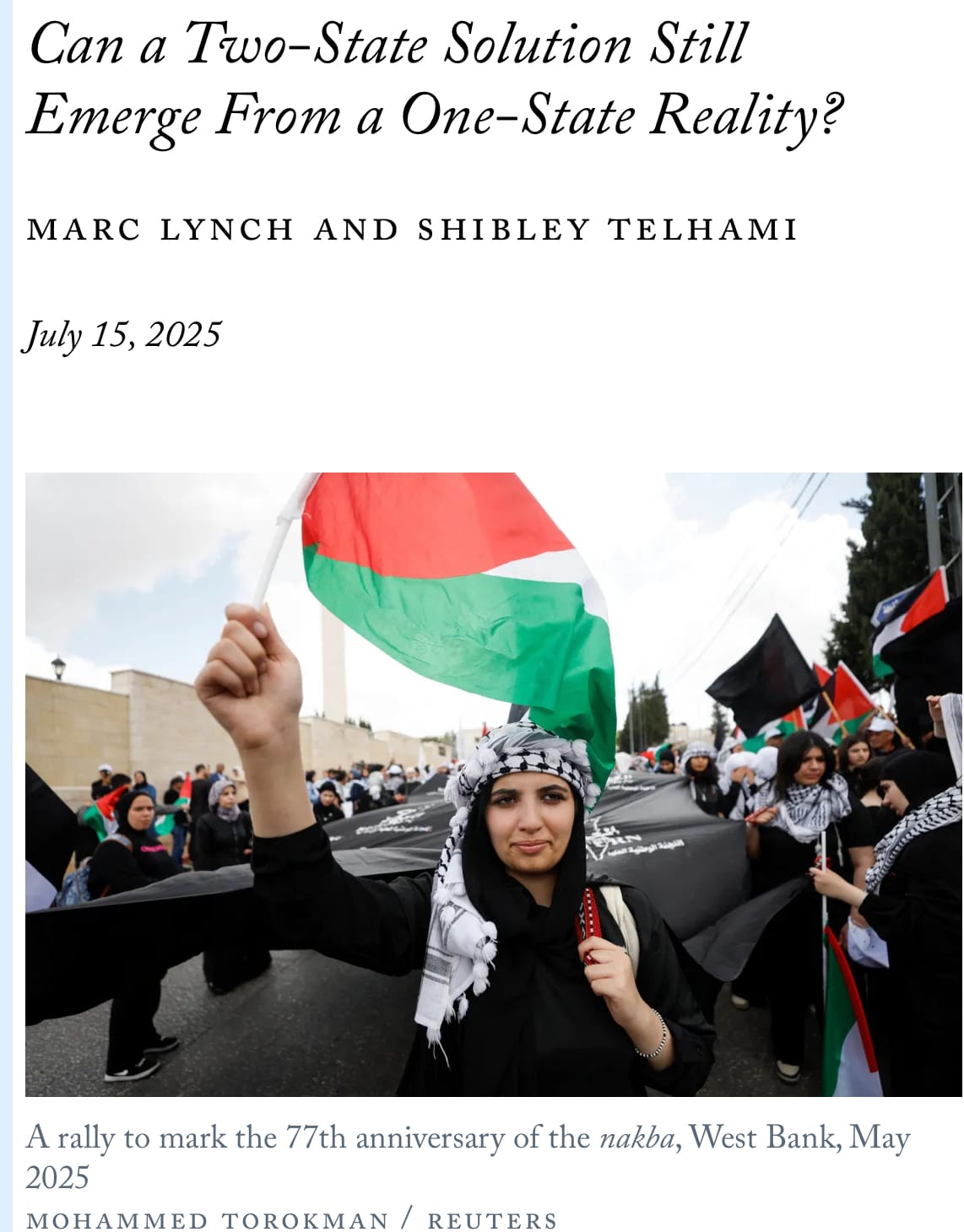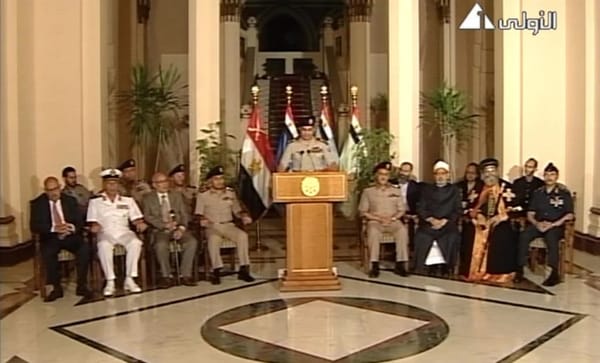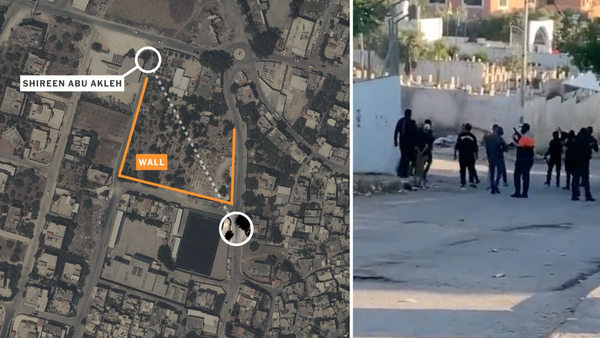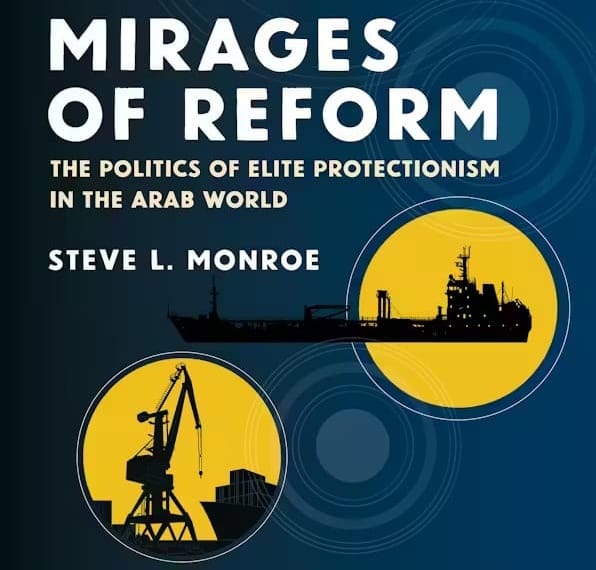Recognizing two states in a one state reality

My new Foreign Affairs piece with Shibley Telhami points out the opportunities and the potential traps of recognition in a new regional reality
Back in June, France and Saudi Arabia were pushing plans for a UN conference on the two state solution for Israel and Palestine centered on a push for a new wave of states to recognizing the state of Palestine and call for a renewed drive towards a two state solution presumably based on the something approximating the 2002 Saudi-led Arab Peace Initiative. The US and Israel were decidely unenthusiastic, mostly because neither the US nor Israel currently supports a two state solution. The push for recognition of a Palestinian state seemed oddly misdirected at a time when Israel has been comprehensively destroying all life in Gaza and rushing towards annexation of the West Bank, while the president of the United States continues to rant and rave about Gaza as a real estate opportunity and his administration punishes anyone and any institution which tries to defend Palestinian lives and basic rights.
In a piece we were preparing for Foreign Affairs, Shibley Telhami and I were skeptical that the UN conference would do much to address the realities of Israeli domination of a one state reality. Refocusing on two states was clearly better than Trump's lunatic ravings about ethnically cleansing Gaza to build beach resorts, but it could only make a positive contribution if it could avoid the trap of using formal recognition and aspirational two state platitudes to avoid addressing the realities of Israeli domination of a very obvious one state reality. Given what we know about Western diplomacy and regional politics, that seemed unlikely to the point of absurdity. Better to take a step back and start doing the bare minimum to protect Palestinian lives from massive ongoing war crimes than to waste time convening an international conference that would change nothing on the ground.
At any rate, the momentum towards the conference halted rather abruptly when Israel launched its surprise attack on Iran out of the blue (not a pre-emptive strike; barely even a preventive one), two days before planned US-Iranian nuclear talks. The twelve day war which followed failed to achieve most of its objectives, beyond killing a lot of Iranian leaders, scientists, and civilians and trashing some infrastructure that can be rebuilt. Trump's dramatic deployment of America's much-hyped bunker buster bombs built to destroy the Fordow nuclear complex underground failed as well. Trump's dramatically coreographed tweets demanding Israel stop bombing and honor a ceasefire did reveal, perhaps, that the US has actually always had a lot more leverage over Israel than the Biden administration claimed to believe. It also suggested that Trump might actually be willing to defy past precendent and try extraordinary things to actually find some regional grand bargain.
Because the question of Gaza and the future of Israel/Palestine isn't going away. With its war with Iran on temporary hold, Israel is back to the daily business of killing dozens of Palestinians a day in Gaza while pushing plans to force those who remain into what can only be called concentration camps. Macron and Saudi Arabia are back to mobilizing international allies to sign on to the push for recognition of a Palestinian state. The course of the twelve days of open war with Iran have opened up some surprising space for potential changes in US policy, as Trump's ever-shrinking and mostly incompetent administration flails about trying to turn a ceasefire into a grand bargain which he can submit in his Nobel Peace Prize application. And so Telhami and I have a new piece today in Foreign Affairs [paywall free link here] asking what a renewed push for a two state solution can accomplish in a one state reality given the current regional context:
Trump is clearly frustrated with the status quo, and as for his predecessors, the most easily available policy gambit he could choose would be a symbolic move that reaffirms a two-state solution but does not truly produce one. The Gulf states, the Europeans, and many other players will tell him that a Gaza cease-fire, while desperately needed, is not enough. Even if a cease-fire takes hold, it’s unlikely to lead to a permanent end to the war. As even many hawkish Israelis have come to accept, the Israeli military will not be able to destroy Hamas. Thus, the only way to terminate the war, short of a sea change in Israeli public opinion or leadership, is for the United States to check an expansionist Israeli government that is armed with ruinous American weapons.
With all this in mind, the push for recognition of a Palestinian state should not be dismissed. If a large new wave of countries jointly recognize a state of Palestine, it would serve as a powerful symbol of growing international frustration with Israel’s obliteration of Gaza and apartheid-like domination of the West Bank. Much of the world would welcome an alternative to the seemingly inexorable drive toward annihilation and annexation. Recognition would also help anchor the debate about the Israeli-Palestinian conflict in international law and could save Gaza from the full-scale destruction and depopulation threatened by some Israeli government ministers. And it would give the Trump administration leverage that it can use to push for the kind of grand bargain he hopes to broker.
But recognition of de jure Palestinian sovereignty in the absence of real change on the ground would be a trap. Recognition cannot be an end unto itself. If many countries choose to recognize Palestine but fail to confront the reality of escalating Israeli domination of the occupied territories, recognition could prove seriously counterproductive. If formal recognition becomes a substitute for defending the primacy of international law and addressing the core realities of Palestinian suffering, it would be at best a hollow gesture—and at worst an epic misallocation of scarce international political capital.
The piece surveys the history of international recognition of the state of Palestine, the long-term failure of two state diplomacy and the consolidation of the one state reality, and the unexpected ways in which the new regional political map might matter. Anyone who has read Telhami and my work on this over the last few years will know that we are deeply pessimistic about two state diplomacy and largely see it as providing cover for ongoing Israeli annexation. But that's what makes this all interesting. Read the whole thing at Foreign Affairs!
After last week's summer hiatus, we will have a full MENA Academy roundup of recent publications this week - stay tuned!



